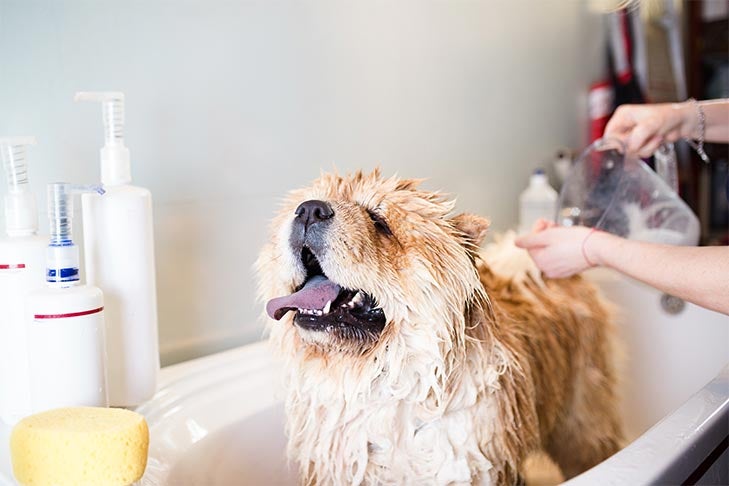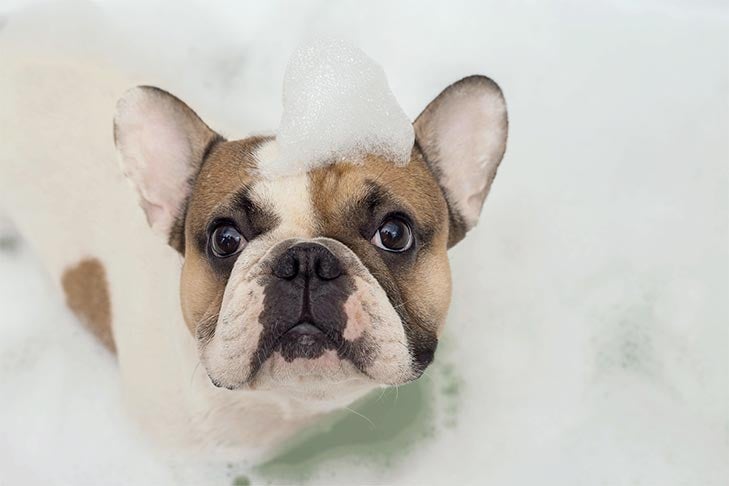
For a lot of new dog owners, it can be difficult to determine how often you should bathe your puppy or adult dog. The truth is, the answer depends on a lot of factors.
“How frequently a pet needs a bath greatly varies based upon their breed, lifestyle, length of coat, and how much homework a pet owner is willing to do,” says Beth Cristiano, owner of Pretty Paws LLC, headquartered in Harrison, N.Y.
What’s Your Dog’s Coat Type?
The type of coat your dog has is a big factor in how often they require baths. However, it’s not as simple as the shorter the hair, the less bathing required. Hairless breeds, such as the Chinese Crested and the Xoloitzcuintli, are actually quite care-intensive, according to Cristiano, who says these breeds require weekly baths.
At the other end of the spectrum are the long-coated breeds, such as the Maltese and the Collie. “Obviously, the more hair a dog has, the more work is involved, including the frequency of the bath,” says Jorge Bendersky, a celebrity dog groomer, pet expert, and best-selling author of “DIY Dog Grooming, From Puppy Cuts to Best in Show: Everything You Need to Know.” He adds, “For dogs with medium-to-large coats, a bath could be needed from weekly to every four to six weeks, as long as the coat is properly maintained in-between baths.”
But a breed such as the Puli, which is technically long-haired, is not bathed as often when corded. According to the Puli Club of America, “the Puli doesn’t develop that typical doggie odor, and really, a Puli probably doesn’t require as many baths as most other breeds.”
So, what about dogs that fall somewhere in the middle? “Thick or double coats on breeds such as Labrador Retrievers, Golden Retrievers, Siberian Huskies, etc., naturally insulate the dogs seasonally,” explains Monica Handy of Woofie’s Mobile Pet Spa. “Overbathing could strip too much oil from the skin and disrupt this process. Using a product specifically for shedding will help avoid this.”

Does Your Dog Have Specific Health Conditions?
If your dog suffers from certain health conditions, your groomer and/or veterinarian may suggest that you use medicated shampoo while bathing your dog. Even if your canine companion is healthy, a grooming regimen using products like de-shedding tools and brushes helps keep them that way. “All pets benefit from monthly ear cleaning and nail trimming,” Cristiano comments. “Thorough coat-brushing and combing and conditioning are more integral to the pet’s health than bathtime.”
Then, there’s the health of the owner. “Sometimes the bath is for the human’s comfort, not the pet’s,” Cristiano continues. “For owners who suffer from allergies, they’ll typically react to their pet’s dander, which can be managed with a weekly bathing routine.” A dander-removing shampoo may also help manage human allergies.
What’s Your Dog’s Lifestyle?
Bendersky notes that an active lifestyle may be easier with a short-coated breed, given that keeping the dog clean in-between baths typically requires less effort. “You can get away with giving short-haired dogs a good rubdown with a damp washcloth to remove the dirt that was picked up during a busy visit to the dog park,” he says.
Of course, dogs that are playing in oceans, hunting in muddy waters, or herding sheep all day may end up needing more baths than pups that spend most of their time indoors — regardless of the breed.
At the end of the day, Bendersky offers this advice: “We should wash our dogs when they are no longer huggable.”
This article is intended solely as general guidance, and does not constitute health or other professional advice. Individual situations and applicable laws vary by jurisdiction, and you are encouraged to obtain appropriate advice from qualified professionals in the applicable jurisdictions. We make no representations or warranties concerning any course of action taken by any person following or otherwise using the information offered or provided in this article, including any such information associated with and provided in connection with third-party products, and we will not be liable for any direct, indirect, consequential, special, exemplary or other damages that may result, including but not limited to economic loss, injury, illness or death.

